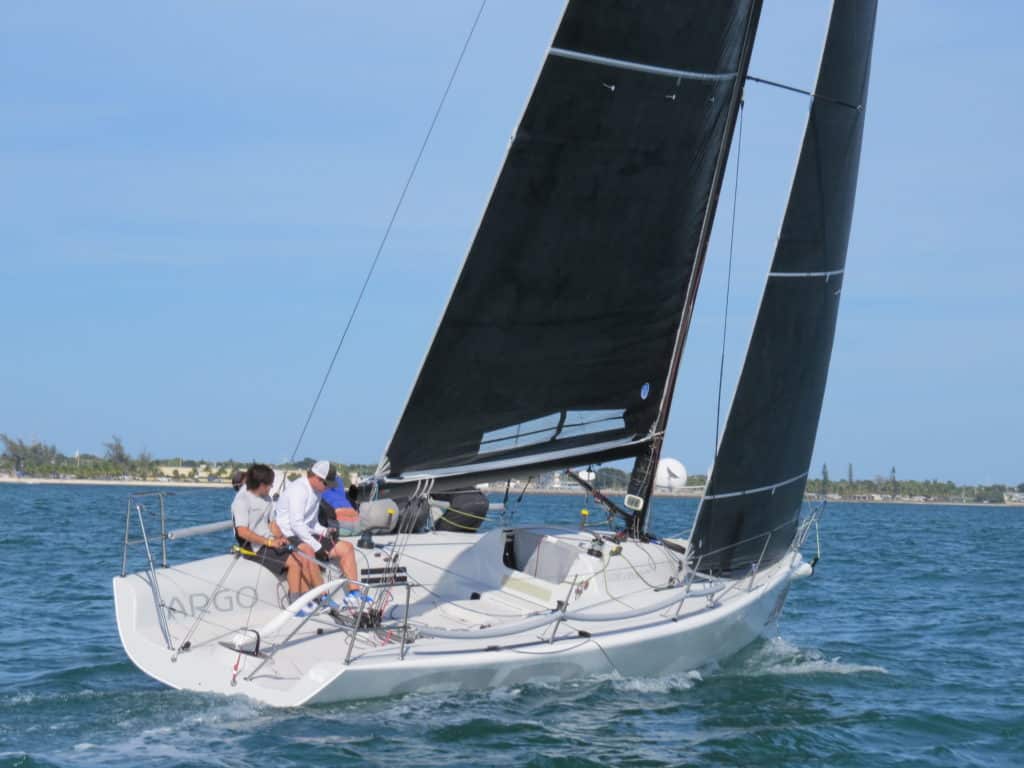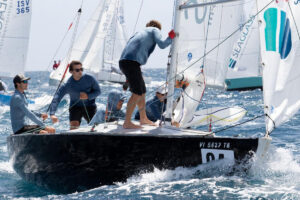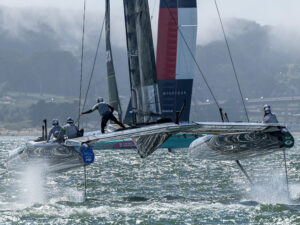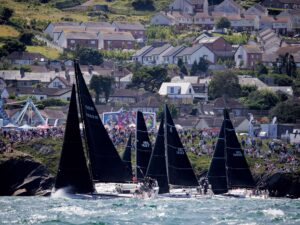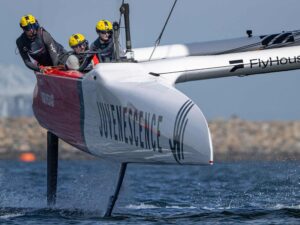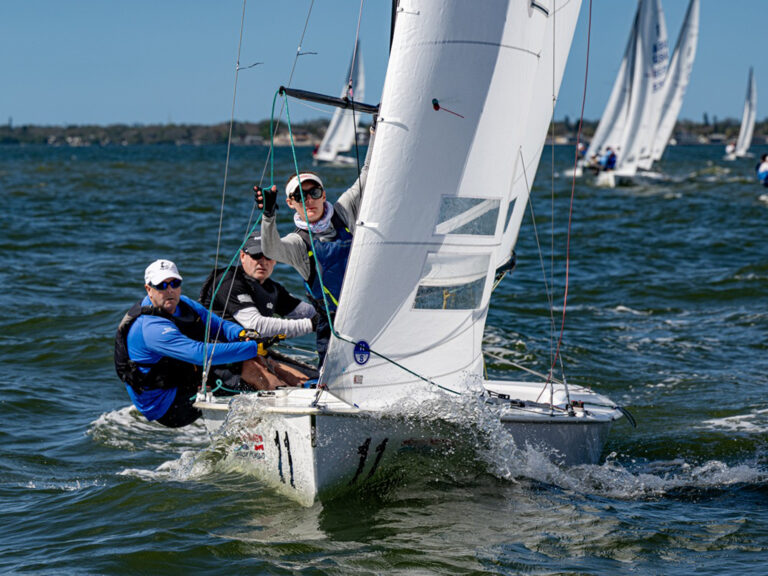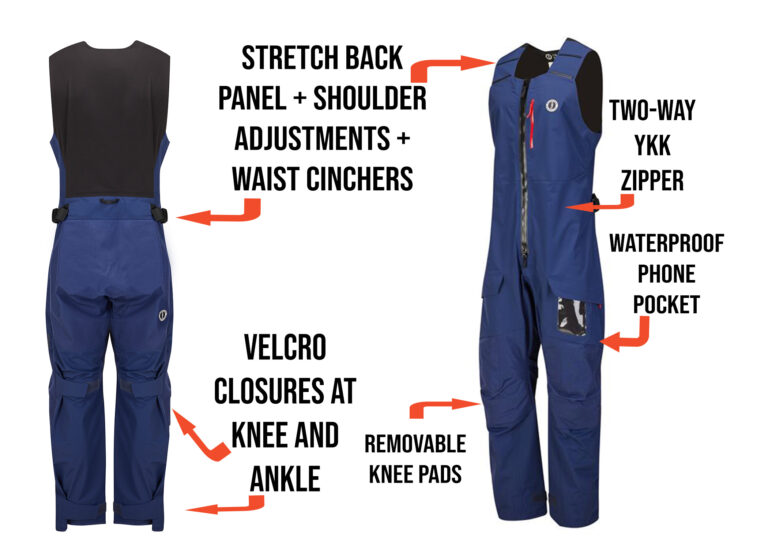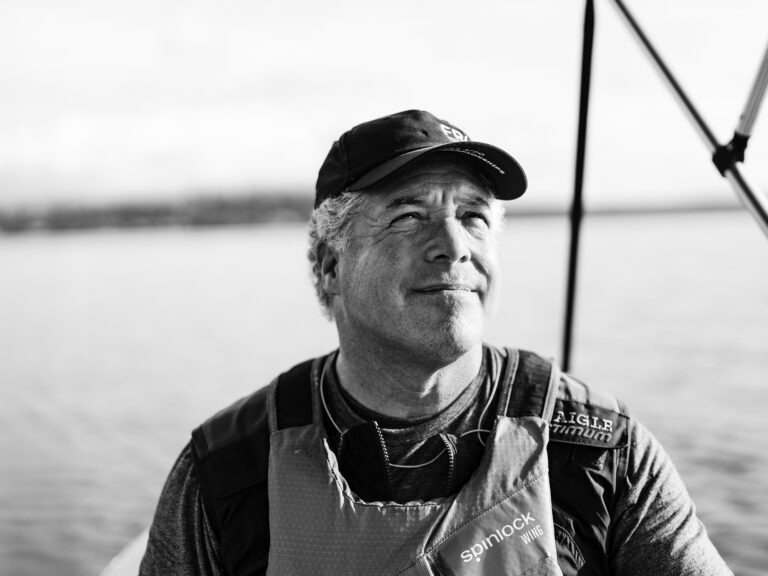Friday, Jan. 23
We worked hard up the first beat to keep pace with Delta And Goombay Smash in a 16- to 18-knot easterly with steep chop. Pushed out to the starboard tack layline early, we overstood the mark and both boats were able to fit inside of us. With the lead boats battling for position at the offset mark we stayed in the high lane and set hot.
After our best hoist of the event we hopped up on a plane and rolled both boats, jumping into first and extending down the leg. Holding off a strong push from Goombay Smash we crossed the line in first for our third race win of the event.
A second place finish in the final race secured second place overall for the “Cargonauts.” I don’t think we, or anyone else in our fleet, had expected such a strong performance from a group of college sailors in a fleet stacked with serious professional and amateur talent.
Throughout the week Chuck Norris emphasized the importance of focusing on the process of improving rarer than results, and that approach served our team well after a couple of tough days in the middle of the event.
I can’t even begin to explain the fun that our team had during the event, but how could we not, with full control of a world champion Melges 32 for a week. Congratulations Hedgehog on a well earned victory this week, and a huge thanks to the Argo team of Jason Carroll, Chad Corning, Chuck Norris, Jim Condon, and Dave Allen for making it such a great experience.
Thursday, Jan. 22nd
The young Argonauts win the day! With the boat dialed in and the crew work refined we were able to showcase our skills in a moderate and relatively steady easterly breeze. We still continue to focus on doing our individual jobs well, which becomes increasingly more difficult as the breeze builds and we find ourselves in close contact with the other teams.
Our 2-1 scoreline for the day did not come easily. In the first race of the day we struggled to get up to speed after a mediocre start at the pin but managed to hit a few shifts up the middle of the course and round in third; the other boats dictated our first downwind and we slipped back to fourth at the leeward mark. Battling back on the next beat we were able to move into second and hold a tight lead on Goombay Smash and Delta all the way down the second run.
With our confidence high after a well-sailed race, we adjusted our setup for slightly more pressure and chop. Executing a great start at the weather end, we were able to roll over the boats to leeward and extend up the leg, rounding in first. We held a comfortable lead until the last beat when large shifts and pressure changes allowed Hedgehog to claw back to within a length. After forcing them to layline we tacked for the finish and crossed the finish line in first for our second race win of the event.
Wednesday, Jan. 21st
After a short postponement on land, the breeze settled in at about 4-7 knots this morning, allowing for a few races in puffy conditions. It was promising to see “Cargo” (College Argo, as the older guys call us) steadily improving and mixing it up with the other teams. Though our results from today were slightly disappointing, we are beginning to sail the boat closer to its potential all the way around the track.
Tactically speaking, the races were quite tricky. We were starting towards the middle of our fleeting and found that crossing the course to find pressure was very difficult. However, predicting the favored side in the prestart has been tough as the Melges 32 fleet is the last of four starts on our racecourse; we have identified that as an area of our preparation to improve moving into the last two days of the event.
The forecast for the next two days predicts moderate to heavy air, and we are eager to transition into faster and more physical sailing.
Tuesday, Jan. 20th
Today showed us the difficulty of racing a Melges 32 at a high level. With unforgiving conditions that featured steep chop and lighter air, our young Argo team struggled to find consistency in boat speed and on the starting line.
With a well-tuned boat, we were forced to identify areas of crew work that were leading to these unexpected struggles. We determined that our crew movement needs more finesse downwind and we have to be quicker to find our upwind mode off the line; keeping pace with an incredibly talented and experienced fleet is no easy task for a group of dinghy sailors. We have steadily improved each day and are sailing the boat well, but have another step to make before we are able to consistently match the tactics and speed of the other boats.
Our debrief focused on broader themes that would quickly improve our confidence and comfort in the Melges 32. The two areas of improvement that we will focus on moving forward are improved channels of communication as well as a greater amount of preparation, contributing to a more complete pre-race plan. We learned a hard lesson that transitioning to a new boat, even with an incredibly talented crew, requires diligent work and constant focus from the entire crew. However, we are far from discouraged and can’t wait to hit the water tomorrow in similar conditions.
Monday, Jan. 19th
As newcomers to the fleet, we really had no idea what to expect as the starting sequence wound down in an unsteady northeast breeze. I was slightly worried about our bow-forward positioning relative to the other Melges 32s. We killed speed aggressively, working high to give ourselves runway for a speed build. Inching closer to the line, I pulled the bow down with about 15 seconds remaining as our trimmers coaxed the boat up to speed; when the starting gun sounded we turned up, sheeted in, and the crew dove down into a full hike.
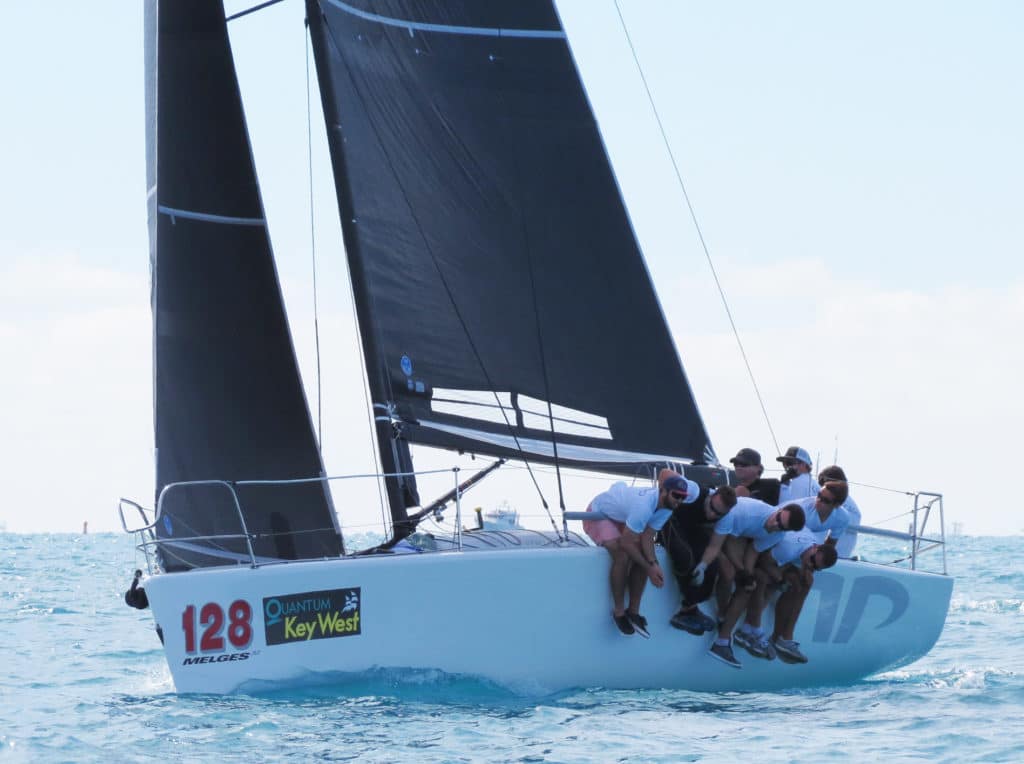
With the speed numbers slowly climbing and the boat locking into its upwind mode, I glanced over my shoulder and noticed that we were pinching off the boat on our hip and pushing over the boat to leeward. The prestart nerves suddenly faded into a feeling of excitement and confidence, knowing that our crew, despite limited time in the boat, possessed skills rivaling all of the seasoned teams on our racecourse. After jumping out to an early lead we never looked back, extending throughout the race to finish in first—certainly a race win that no one on the crew expected would come so early in the week.
Though Argo did not fare quite as well in the day’s second race, we still sit in second place, awaiting a chance to continue improving and learning the boat in trying conditions.
Sunday, Jan. 18th
When Jason Carroll offered me the keys to his Melges 32 Argo for Quantum Key West Race Week 2015, I knew the event was going to be an experience of a lifetime. As the helmsman, I was given control of selected a crew of collegiate sailors in addition to our veteran trimmer, Scott “Chuck” Norris. Only a few of the guys had ever stepped foot onto a Melges 32 before our first practice in Key West on Friday afternoon, but with a boat fresh off a world championship win last month—and after a bit of practice—we seem on track to turn in a great performance over the next week.
Given the new crew and positions, most of our three training days have been focused on basic boat handling maneuvers and straight-line speed; luckily the boat is perfectly tuned, bringing us up to speed quickly. Today’s session was the first time we raced against other boats, and the early part of the practice demonstrated the importance of paying attention to the details as we struggled to execute clean sets in crowded weather mark roundings. After a quick chat from Chuck about “doing your job well,” a familiar saying in the Argo program, we returned to form and went quite well against the four other world-class boats. Tomorrow should present more of the same moderate conditions making for an exciting day of racing.
Click here to go back to Sailing World‘s coverage of Key West.
